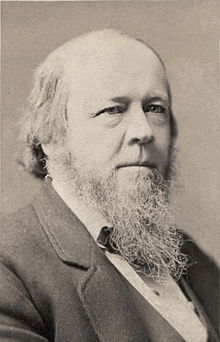Benjamin Silliman Jr.
| Benjamin Silliman Jr. | |
|---|---|

Benjamin Silliman Jr. c. 1865
|
|
| Born | December 4, 1816 New Haven, Connecticut |
| Died |
January 14, 1885 (aged 68) New Haven, Connecticut |
| Fields | chemistry |
| Alma mater | Yale University |
| Known for | oil |
| Influences | Benjamin Silliman |
Benjamin Silliman Jr. (December 4, 1816 – January 14, 1885) was a professor of chemistry at Yale University and instrumental in developing the oil industry.
His father Benjamin Silliman Sr., also a famous Yale chemist, developed the process of fractional distillation that enabled the economical production of kerosene. In 1855, Silliman Jr. wrote a report for $526.08 on Pennsylvania rock oil and its usefulness as an illuminant that convinced investors to back George Bissell's search for oil.
In the 1850s the market for light-producing liquid fuels was dominated by coal oil and by an increasingly inadequate supply of whale oil. However, George Bissell, a lawyer from New York, and his partner Jonathan Greenleaf Eveleth had a revolutionary idea. They thought there was a possibility of the crude “rock oil” (now petroleum) that had been cropping up in western Pennsylvania being used as an illuminatory substance. At the time, rock oil was nothing but a smelly hindrance to the well-diggers of the region, with some limited medicinal properties. Yet Bissell and Eveleth, after realizing how flammable the liquid was, believed there was great money to be made in producing rock oil commercially, marketed as lamp fuel and such. But they needed someone—an important, well-respected scientist—whose name they could attach to their financial venture, to research the material to find out whether or not it could be used in such a manner. They found Benjamin Silliman Jr., professor of chemistry at Yale.
Benjamin Silliman’s primary contribution to the chemical world, and certainly the world as a whole, involved the fractional distillation of petroleum, analyzed mainly for the purpose of its qualities of illumination. He was asked to do this as one of the most prominent chemists of his time, and his report on the subject afterwards had extremely far-reaching influences. The immensely important main idea of his report was that distilled petroleum burned far brighter than any fuel on the market, except those that were far more expensive and less efficient. His conclusion was that petroleum is “a raw material from which...they may manufacture a very valuable product.” Silliman also noted that this material was able to survive through large ranges of temperature, and the possibility of it being used as a lubricant.
...
Wikipedia
